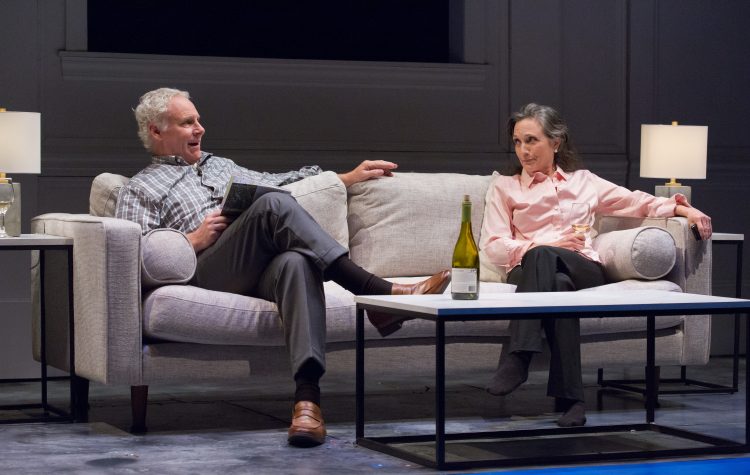
A Small Fire by Adam Bock. Directed by Joanie Schultz. Philadelphia Theatre Company, through November 10, 2019, at the Suzanne Roberts Theatre, 480 S. Broad Street in Philadelphia.
A small fire sets off an early warning. Something is amiss in the serene life of a middle-aged couple. The husband smells something that his wife left burning in their kitchen.
The first thought is that she’s showing an early symptom of Alzheimer’s. (Indeed, she did forget that she left soething unattended there.) But playwright Adam Bock is heading in a different direction. He has just depicted the first in a series of malfunctions that will befall the character played by Bebe Neuwirth.
First, she abruptly has lost her sense of smell. Then she loses all sense of taste. And then her eyesight. And her hearing. Each of these happens separately, suddenly and completely. (Not gradually as things happen in real life.)
Neuwirth goes far beyond her fine reputation as a dancer and a comic actress and gives a poignant performance as the suddenly handicapped Emily Bridges. She displays subtle physicality and is touching as she is forced to retreat into silence, not knowing who is in her presence.
You could judge this to be contrived and unbelievable. Or you might, charitably, judge it as a profound allegory. We might imagine how any of us would react if something went seriously wrong in our life, or in the life of a loved one. Is it necessarily a disaster; or is it an opportunity to show true devotion?
As stage director Joanie Schultz says, adversity can provide opportunities to be supportive and grow closer.
The playwright’s originality deserves praise. It’s so hard for anyone to find an original idea. But the development of the plot doesn’t live up to the promise.
The opening scene presents a sketchy, unconvincing portrait of a female construction company executive, and the next scene gives a rough idea of her as a demanding wife and mother. These are obvious set-ups to contrast with her subsequent loss of power.
Sometimes the script lacks common sense. The couple has been introduced to their daughter’s fiancee and his family. Later in this one-act play the daughter tells her parents she’s moving away and informs them of what they already know: that they live in a different state.
On top of this is an unnecessary sub-plot about carrier-pigeon races.
John Dossett is sympathetic as the befuddled husband, trying to comfort his wife as she drifts into solitude, and to hold himself together during the ordeal. Sarah Gliko does what she can with the role of the self-centered adult daughter. Oge Agulué struggles as a nice guy who supposedly takes total command of a construction company.
One of the production’s best features is an attractive set by Chelsea M. Warren consisting of a series of walls, with windows in the center of each, suggesting vistas for hope in the midst of obstacles.
Everyone hopes for the success of this company under its relatively new leadership, but the jury is still out. The reaction of the opening night audience, packed with board members, was revelatory. I saw many of them squirm in their seats, and their applause at the end was muted. Some felt let down by the somber topic and the lack of a happy ending; others by the flawed script.
Significantly, the company’s Producing Artistic Director, Paige Price, and Managing Director Emily Zeck both are female. So is the director of this play, and the next two productions are by female playwrights. In addition, this company pledged to spotlight female, trans, and non-binary voices. That’s not unusual anymore, and it will take more than that to create success. And, sadly, this isn’t good enough for some protesters.
Previously under-represented voices are now dominating in the Philadelphia theater community. Male, straight, white subjects and actors were a small minority among this year’s Barrymore Award winners. Despite this fact, some activists have criticized the Philadelphia Theatre Company for “not showing enough diversity” — thus engendering even more sympathy for the company.